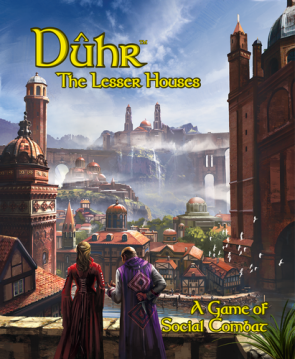The first three published games from Jim Felli were all true originals. Oh sure, there was DNA from previous designs. But whether he was redefining the adventure game with Shadows of Malice or designing perhaps the heaviest take-that game ever in Zimby Mojo, Felli has never been afraid to leave his mark on a genre. A couple years back he did it once more with Bemused, a strange combination of deal-making and social deduction that was his most refined game yet. All three games were as different from each other as they were from everything else. Now we have Duhr: The Lesser Houses, and for the first time Felli is repeating himself a little.
In Duhr: The Lesser Houses the players are different minor noble houses in the titular city. They will spend the whole game casting suspicion on each other in strategic ways, through the use of cards. If enough of these suspicion cards stick to you, your house becomes Disfavored, and your options will be slightly constrained. If enough of those cards are more damaging scandals, your house becomes outright vilified, and you will be forced to drag down everyone else to have a shot at winning. There are also agendas that will give the houses bonus points based on the final results of the game, and agents that serve in other houses to give the players some more options.
For those who are familiar with Bemused, you will notice that in broad strokes this is basically the same game. There are some key differences though, chief of which is the setting. Bemused had one of the most unique settings I’ve ever seen in a game, with the players as muses trying to drive the artists of other muses to insanity or even death. It wins points for originality, but I think that Duhr: The Lesser Houses benefits from its more pedestrian locale. Frankly, this new version just clicks better. Its mechanics make perfect sense in the world of medieval backbiting, and while the players could read the background printed in the rulebook, they won’t need to for the game to make sense thematically. This represents a first in Felli’s games, which are all set in bizarre settings with weird names that require a lot of table-setting before the game itself can be explained. It’s nice to be able to explain this stuff without having to explain what a gemina is, for example.
The other changes are generally to the game’s benefit. Deal-making has the biggest boost. In Duhr: The Lesser Houses the players are actively encouraged to swap cards with each other, something not made explicit in Bemused. (That I could find anyway.) This card-swapping is much easier to justify thematically in Duhr: The Lesser Houses, where the cards represent suspicion and scandal rather than dread and despair. Not only that, but in Bemused having enough bad cards killed your artists, an obviously permanent condition. But the equivalent status of villainy in Duhr: The Lesser Houses can be reversed, giving the player way more flexibility. That makes the game feel more winnable whatever situation the player finds themselves in.
The biggest change is the addition of Masterstrokes. These are special actions players can take by using two matching suspicion cards. It’s basically a kind of bomb, a way to cancel someone else’s action or remove a specific card from play. They can even be played out of turn when they negate another player’s action. Think of it like the Cosmic Zap in Cosmic Encounter. These are great. In one swoop they solve a lot of issues present in Bemused. First of all, it’s easier to get any matching pair of cards rather than a specific color from the deck. (The addition of increased card-swapping helps too.) It also gives a player options when they don’t have the color they need to affect the right players, or to help themselves in any meaningful way. There are also now more ways to threaten and cut bargains with your opponents. Lastly, they just shake up the status quo. For as weird and wild as Bemused could be, it often found itself in something of a deterministic state where the players could not really prevent something inevitable. Masterstrokes make the whole thing feel much more dynamic.
I hope that Duhr: The Lesser Houses has found an audience outside of Felli’s cult following, because I think my greatest impediment to enjoying this game has been its similarity to Bemused. I actually think Duhr: The Lesser Houses is the stronger, more elemental design, but it is close enough to Bemused that parsing out how similar mechanics worked in different games was surprisingly challenging. This is compounded by the fact that Felli is not one to shy away from complexity, even in a game that runs about 30 minutes on average.
And after four games from Felli, I am ready for a game where all of this complexity is at my fingertips, rather than buried in the rulebook. Frankly his games are hard to actually play. All four of his designs are in dire need of player aids, and enough of them for each player to have their own. Some have been provided after the fact in past designs, and there are some here as well, though still not enough for a table of six players. (And you do want six players, believe me.) These would reduce the need to look things up in the rulebook, which has always been a little tricky in his games. This feels like a minor point, but I want to play his stuff as often as possible, and they reveal their mysteries slower than they need to. He has always designed complex games, and that’s fine, but he has yet to nail down how to convey that complexity in a way that makes it as accessible as possible, either in the rules or graphic design. To be fair, Duhr: The Lesser Houses is easily the best he has done with this difficult task so far, but it’s not quite where it needs to be yet.
But this far in I know what I’m in for, and most of Felli’s fans will too. In the end, Duhr: The Lesser Houses is a really fun game. In spite of being something of a retread, it makes a strong case for itself. Those who enjoy Bemused will find this to be a more dynamic and focused experience. While Bemused represented a massive leap forward for Felli in terms of accessibility, Duhr: The Lesser Houses is more intuitive and loose in its execution. It’s got a clearer idea of what kind of game it is, drawing attention away from the hidden roles and on to the deal-making and backstabbing. The feeling of both is different enough that I don’t mind holding on to both games, though I say that from the standpoint of a fan. For those who have yet to try one of Felli’s games, Duhr: The Lesser Houses is the way to go. Bemused wins the award for originality, but Duhr: The Lesser Houses is the one that I expect I will return to more often.
 Games
Games How to resolve AdBlock issue?
How to resolve AdBlock issue? 






















